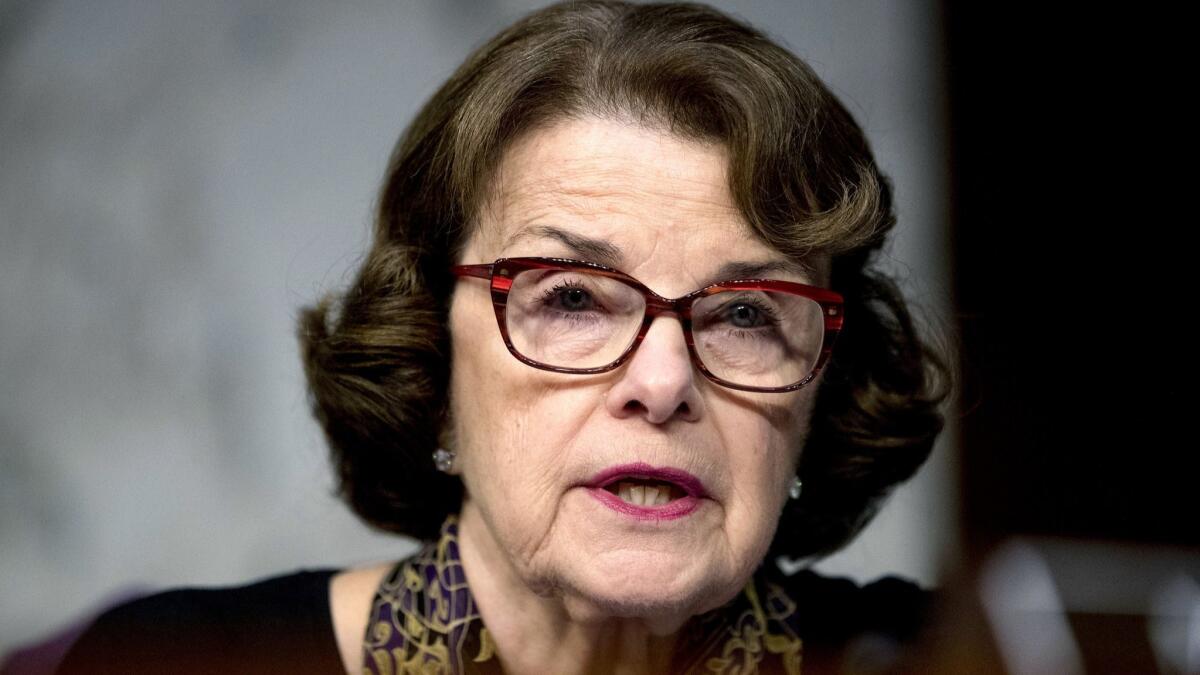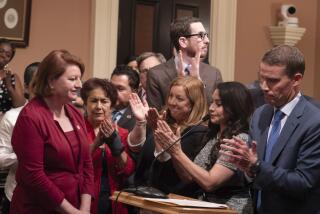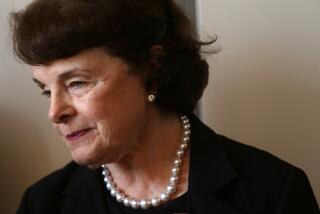Op-Ed: Is it OK to wish Sen. Dianne Feinstein would retire?

Among Democratic voters in California, I wasn’t alone in my disappointment that Sen. Dianne Feinstein decided to seek reelection. Again. It was a strange feeling, though, since I’m a person who advocates for more women to have more voice in politics and women make up only 23% of the U.S. Senate. Was I really eager for one of the highest-ranking female Democrats — one with seats on several powerful committees — to retire?
In a phrase — um, kinda, sorta, yes?
I wouldn’t think twice about calling for the retirement of an aging male senator. But it’s hard to be critical of Feinstein’s tenacity — or really, that of any woman with a decades-long history in politics — without raising the specter of sexism. Somehow it’s always the elder stateswomen who are urged to retire to pave the way for fresh faces. I recall, for instance, all the times Hillary Clinton was asked to bow out in 2008 or 2016.
Like Clinton, Feinstein has persisted despite cues that it’s time to retire. She left the state Democratic Party convention in February with no endorsement. She dismissed earlier pleas from supporters to let a younger (and, implied, more progressive) candidate have a shot. The whole primary campaign painted her as the pliable old guard preventing the ascension of an uncompromising up-and-comer. “We demand passion, not patience,” said challenger state Sen. Kevin de Leon.
Somehow it’s always the elder stateswomen who are urged to retire to pave the way for fresh faces.
Undeniably, Feinstein was a trailblazer for women in politics. She was elected in 1992, dubbed the Year of the Woman because it saw a record number of four — yes, just four — women elected to the Senate. She was already nearly 60. She just celebrated her 85th birthday, making her the oldest sitting senator, edging out Charles E. Grassley (R-Iowa) by a few months. If all goes according to her campaign promises, she’ll be 91 at the end of her six-year term.
Among those who agree with Feinstein’s policy positions and value her hard-won committee seats, the main argument for her retirement is her age. In the Senate, of course, seniority is power and historically women have been older when they start their political careers — and, presumably, should be older when they end them. But this doesn’t really apply to Feinstein, who was first elected to the San Francisco Board of Supervisors when she was 36. She was no political late-bloomer. Even so, I’ve asked myself if my aversion to filling in the oval beside Feinstein’s name stems from our culture’s deep-seated aversion to older women in the public sphere. After all, men tend to gain visibility and power as they age, while women increasingly get relegated to the background.
Enter the Fray: First takes on the news of the minute from L.A. Times Opinion »
A notable exception is Ruth Bader Ginsburg, who is Feinstein’s age and has seen her popularity soar in recent years. But unlike Supreme Court justices, senators are not expected — or, indeed, relied on — to serve for the duration of their lives. California has no shortage of politicians who share Feinstein’s values. Especially with her blessing, voters would be eager to elect them. Unlike Ginsburg, Feinstein is not irreplaceable in this political moment.
I had hoped Feinstein would step down early enough to be a powerful supporter of a successor. I’d have loved to have her remain in the political game — fundraising, identifying promising new candidates in California, and shaping both strategy and policy. Imagine what would be possible if California Democrats could draw on her considerable skills, while also looking toward the future?
If the polls are to be believed, though, she will handily win reelection and go back to Washington. Feinstein, who had a $10-million campaign war chest, walked away with 44% of the primary vote, compared to De Leon’s 12%. De Leon even failed to beat her in his home district in Northeast Los Angeles.
“I’m not gonna let you down,” Feinstein said in declaring victory on primary night. Unfortunately, by running again, she already has.
Ann Friedman is a contributing writer to Opinion.
Follow the Opinion section on Twitter @latimesopinionand Facebook
More to Read
A cure for the common opinion
Get thought-provoking perspectives with our weekly newsletter.
You may occasionally receive promotional content from the Los Angeles Times.






